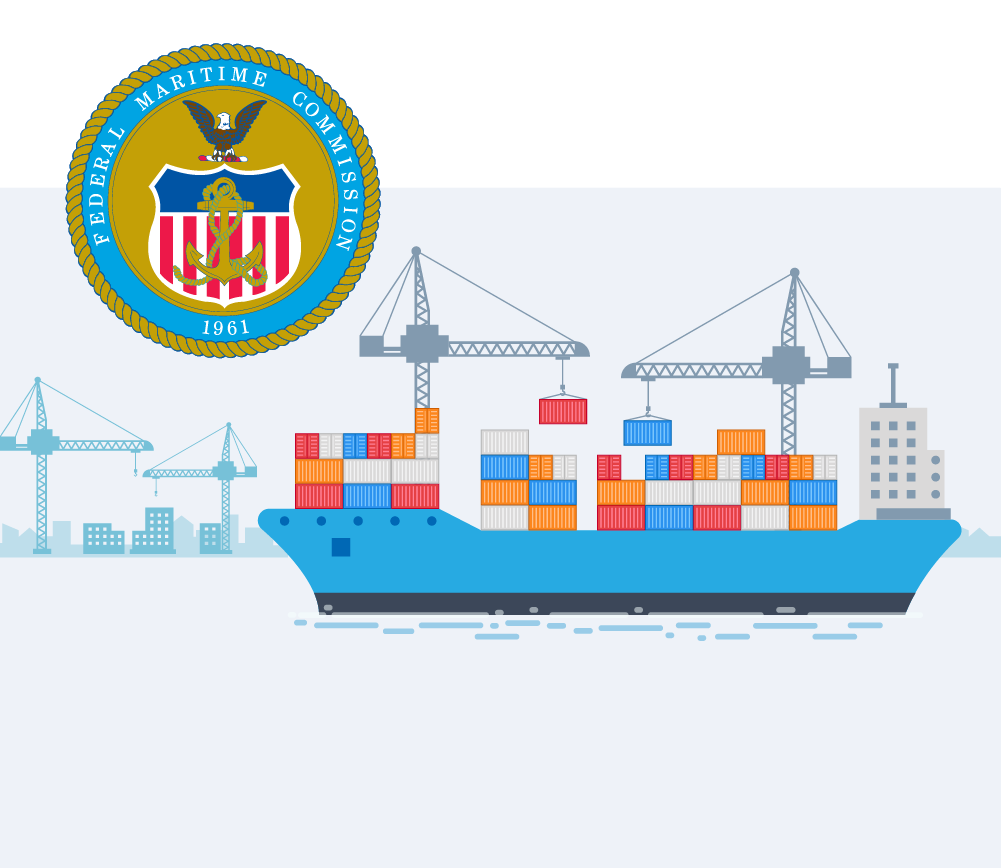What is the FMC?
The Federal Maritime Commission (FMC) was established as an independent federal agency in 1961. Its creation stemmed from the need to regulate and oversee the U.S. international ocean transportation system. Comprising five commissioners appointed by the President and confirmed by the U.S. Senate, the FMC operates with the aim of ensuring fairness, competitiveness, and reliability within the ocean shipping industry.

Functions and Regulatory Role:
Dispute Resolution:
- Adjudication: The FMC adjudicates disputes among various entities within the shipping industry, offering binding rulings to settle conflicts.
- Alternative Dispute Resolution: Additionally, it provides non-binding methods like mediation to help parties negotiate and resolve disputes.
Agreement Oversight:
- Reviewing Agreements: It carefully scrutinizes agreements between carriers and terminal operators to ensure they align with fair practices and do not impose unjust costs on shippers.
- Service Contract Monitoring: Regular monitoring of service contracts to prevent adverse impacts on shipping efficiency.
Regulatory Oversight:
- Tariff Transparency: Ensuring carriers tariff rates and charges are accessible to the public.
- Monitoring Government-Owned Carriers: Overseeing rates and charges to ensure fairness from government-owned or controlled carriers.
Consumer Protection:
- Dispute Resolution: Resolving cargo shipment disputes and addressing complaints between cruise operators and passengers.
- Investigative Authority: Investigating complaints regarding carrier rates, charges, and practices to safeguard consumer interests.
- Licensing OTIs: Licensing Ocean Transportation Intermediaries with appropriate qualifications and financial reliability.
Mission of the Federal Maritime Commission (FMC):
The FMC primary mission is to ensure a competitive and reliable international ocean transportation supply system that supports the U.S. economy and protects the public from unfair and deceptive practices. This overarching mission encompasses several key objectives and functions:
- Ensuring Fairness in Agreements: Reviewing agreements between ocean carriers and marine terminal operators to prevent substantial increases in transportation costs or decreases in service quality.
- Tariff Regulation and Transparency: Maintaining and reviewing confidentially filed service contracts to safeguard against detrimental effects to shipping. Ensuring carriers tariff rates and charges are published and electronically available to the public.
- Dispute Resolution and Consumer Protection: Providing a forum for exporters, importers, and other members of the shipping public to obtain relief from ocean shipping practices or disputes that impede commerce. Resolving disputes involving cargo shipment, personal or household goods, and addressing complaints between cruise vessel operators and passengers.
- Regulating Rates and Practices: Monitoring rates, charges, and rules of government-owned or controlled carriers to ensure they are just and reasonable. Investigating and ruling on complaints regarding rates, charges, classifications, and practices of common carriers, marine terminal operators, and Ocean Transportation Intermediaries (OTIs).
Key Acts and Legislation:
Shipping Act of 1984:
- Purpose: Modernized existing laws governing the ocean shipping industry.
- Key Provisions: Defined "contract carriage" for negotiated pricing of ocean liner services, eliminated the need for carriers to file tariffs with the commission, and introduced reforms to adapt to changing transportation methods.
Foreign Shipping Practices Act of 1988:
- Purpose: Strengthened the FMC authority to investigate and impose penalties in cases where U.S. shippers were disadvantaged due to unfair foreign shipping practices. Aimed to protect U.S. ocean-based carriers from such practices.
Merchant Marine Act:
- Section 19 (1920): Deals with the regulation of ocean transportation, ensuring fairness, efficiency, and transparency in the shipping industry. Ocean Shipping Reform Act of 1998
- Purpose: Deregulated the ocean shipping industry, allowing common carriers to privately negotiate rates with shippers instead of filing them publicly. Introduced measures to adapt to changing trade practices.
Ocean Shipping Reform Act of 2021:
- Purpose: Proposed to overhaul ocean shipping legislation to address supply chain disruptions, particularly those caused by the coronavirus pandemic and increased demand for imported goods.
- Key Provisions: Shifted the burden of proof onto carriers in disputes over unfair practices, aimed to promote reciprocal trade, and empowered the FMC to impose additional penalties on carriers for harming exporters.
Guiding Legislation:
The FMC regulatory actions are guided by key statutes such as the Shipping Act of 1984, Foreign Shipping Practices Act of 1988, Merchant Marine Act, among others. Legislative amendments have been consistently made to these acts to adapt to evolving industry dynamics and ensure regulatory efficacy.
Impact and Purpose:
- Supporting the U.S. Economy: The FMC facilitates efficient and competitive international shipping, benefiting U.S. businesses by ensuring a level playing field.
- Consumer Protection: By regulating and overseeing shipping practices, the FMC protects consumers and ensures fairness within the supply chain. Industry Standards: It maintains and enforces regulations to promote fair competition, reliability, and integrity within the ocean transportation sector.
Conclusion:
The Federal Maritime Commission, as an independent regulatory body, plays a pivotal role in supervising and shaping the U.S. international ocean transportation system. Through its multifaceted functions, it aims to create a fair, competitive, and reliable shipping environment while protecting the interests of both industry stakeholders and consumers. Guided by specific legislative frameworks and amendments, the FMC ensures adherence to regulations that foster a robust and trustworthy ocean transportation network supporting the nation economy.